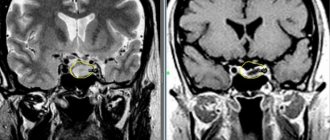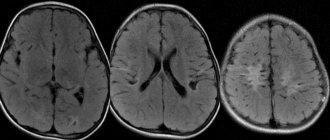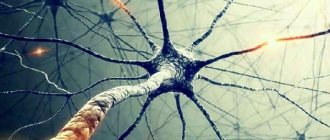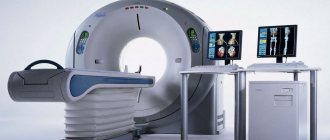Anterograde amnesia is a failure of memory, which is caused by organic damage to the structure of the brain.
The disease itself is characterized by the fact that the patient cannot remember any event after the development of anterograde amnesia, surgery or trauma.
The patient remembers all events up to the fatal moment perfectly.
The pathophysiological mechanism of the disease itself is a disruption and failure of the process of transporting information from short-term memory to long-term memory or destruction that affects the stored information.
After a certain time, memory may be restored, but not in full - the patient may have memory gaps in the post-traumatic period. A positive aspect when diagnosing such a disease is the patient’s ability to continue to master different skills.
What can memory do?
Memory allows us to study and organize information and past events . This is closely related to attention, another basic psychological process. The process consists of three stages: encoding, storage and recall.
We can think of memory as a three-part psychological process by which we encode information, store it in the brain, and recall it when we need it. The most important part is that the information we learn is remembered when it is not right in front of us. Sometimes we remember things quickly and accurately, and sometimes with great difficulty.
Memory research in cognitive psychology and cognitive neuroscience shows that the brain has multiple memory systems. In turn, each of them has its own characteristics, functions and processes.
Inability to access memories or learn new things
Amnesia is diagnosed when a person has severe memory problems. These may include an inability to store new information or recall previously stored information.
Organic amnesia is the result of physical damage to the brain caused by illness, injury, or even substance abuse. On the other hand, dissociative amnesia is caused by other psychological factors.
In addition, there have been cases of spontaneous amnesia, such as transient global amnesia. This is a sudden loss of memory for no apparent reason. It occurs more often in older men and tends to last less than 20 hours.
Amnesia can also be classified by the type of memories that a person cannot remember or form. Anterograde amnesia is the inability to form new memories. Retrograde amnesia is the inability to remember past memories to which a person had access.
People with anterograde amnesia may remember things that happened in their youth. But they cannot recognize or remember things that happened after the trauma that caused the amnesia.
Classification - unconsciousness comes in different forms
The types of amnesia can be classified according to several criteria, depending on the rate of its development, the following types are distinguished:
- Regressive . Characterized by the gradual recovery of forgotten memories. This type occurs in people who have suffered from traumatic brain injuries, concussions, or have recently recovered from anesthesia.
- Stationary . In this case, individual events are deleted from memory. This process is persistent, without change, that is, a person forgets certain events from his life and does not remember them again. The causes of this type of disorder can be senile dementia, psychological trauma, and head trauma.
- Progressive . Memories are removed from memory gradually, starting from recent ones and ending with long-past events. This type of amnesia is characterized by clearer preservation of childhood and youth memories, as well as professional skills and abilities. This kind of memory impairment is caused by brain tumors and mental illnesses.
Amnesia is also classified depending on the moment at which individual memories were lost:
- Retrograde . This is a pathological condition in which a person’s memory “falls out” of events that occurred before the development of the disease or injury that provoked amnesia. At the same time, facts and events that occurred in the distant past are preserved, especially if they have great emotional significance for the victim. Retrograde amnesia develops due to cerebral circulation disorders, traumatic brain injuries, stressful situations, and deep emotional upheavals.
- Anterograde . This condition is characterized by the loss of events that occurred after the disease causing amnesia developed or after receiving a severe head injury. This type of memory impairment occurs in old age, after traumatic brain injury and infectious diseases, and in the presence of mental disorders.
- Anteroretrograde . As the name indicates, this type of amnesia combines the features of the first and second types described above and occurs after particularly severe head injuries. As a rule, certain events preceding the turning point and some events following it are forgotten.
- Retarded, or delayed . In this case, memory impairments do not appear immediately, but only some time after the turning point. May occur against the background of acute psycho-emotional shocks.
Separately, it is necessary to mention such types of memory impairment as transient global and alcoholic amnesia.
Transient disorder
Transient global amnesia is a temporary phenomenon in which a person suddenly loses memory and spatial references.
At the same time, he is able to remember his own name and the names of loved ones, add numbers, and keep count. The duration of this state ranges from several hours to several days.
After a certain period, the person regains all his abilities. This happens spontaneously.
Transient amnesia is quite rare: according to statistics, the incidence rate is 3 per 100,000 people per year. It is observed in elderly people.
The reasons for this phenomenon have not been fully studied, but it is assumed that they include:
- violation of transient cerebral circulation;
- epilepsy;
- disturbances in the functioning of the vascular system of the brain;
- suffered stress;
- migraine.
No specific treatment is required for transient global amnesia; all symptoms go away on their own.
Alcohol affects memory
Alcohol amnesia is a memory impairment that is associated with alcohol abuse. In this case, we are talking about a person’s inability to remember events that occurred after intoxication and to be aware of the actions performed in such a state. This occurs due to disruption of nerve impulses caused by alcohol consumption.
With severe alcoholism, it is not just individual episodes that can be erased from memory, but entire fragments of ongoing events. Subsequently, constant heavy drinking can lead to alcoholic dementia, which is characterized by total memory loss with preservation of memory processes.
To prevent this from happening, you need to treat the root cause – alcohol addiction. During treatment, it is necessary to prescribe medications that help restore brain function, as well as drugs to improve blood circulation and nutrition of the brain.
If treatment is not started on time, there is no guarantee that the memory will return to the alcohol-dependent patient in full.
Korsakoff's syndrome
Of all the organic types of amnesia, Korsakoff's syndrome is the most common. It is caused by a deficiency of thiamine in the brain, usually due to chronic alcoholism. It was named after Sergei Korsakov, the man who discovered it.
Korsakoff's syndrome is characterized by acute mental distress and spatiotemporal disorientation .
Often, the onset of Korsakoff's syndrome follows an acute episode of Wernicke's disease or Wernicke's encephalopathy. When both occur together, it is called Wernicke-Korsakoff syndrome.
The main symptoms of Wernicke-Korsakoff syndrome include:
- ataxia (lack of coordination);
- ophthalmoplegia (paralysis of the eye muscles);
- polyneuropathy (pain and weakness in the same parts of the body on both sides).
People with Wernicke-Korsakoff syndrome also suffer from:
- disorientation in time and place;
- inability to recognize family members;
- apathy;
- attention deficit;
- inability to carry on a coherent conversation.
Retrograde amnesia
Severe traumatic brain injury, from a fall, accident, or electrical shock, can cause retrograde amnesia. Retrograde amnesia is defined as the inability to remember past events . In many cases, amnesia goes away and the person gradually regains his memory. In the best cases it comes back completely.
Retrograde amnesia typically erases memories just minutes before the injury. If the blow is really bad, it can affect memories from months or even years ago.
Anterograde amnesia: life without a future
Some injuries cause global, permanent memory deficits without any other decline in intellectual ability. In these cases, the person does not have problems with language, perception, or attention. In addition, they retain the skills they had before the injury.
People with anterograde amnesia have incredible difficulty retaining new information , but they can carry on a conversation. Their memory works fine, but after a few minutes they cannot remember what just happened.
Thus, people with anterograde amnesia cannot learn new things (or have a very difficult time). Sometimes they can't even remember information from the past . It's almost like living forever in the present. The past does not exist and they cannot make plans for the future because they will forget them.
Related brain regions
One of the main tasks of modern neurobiology is to find out which areas of the brain play a role in anterograde amnesia . In general, the brain damage that causes it is thought to occur in the hippocampus and medial temporal lobe.
These areas of the brain act as a passageway where events and facts are stored temporarily until they are stored more permanently in the frontal lobe. The hippocampus as a storage facility for short-term memory .
If it cannot store information correctly, it will not be able to reach the frontal lobe. This means that the brain cannot form long-term memories. In cases of partial amnesia, memories can be formed but have very little actual detail.
However, although the hippocampus may seem to be the most important area of anterograde amnesia, recent research suggests that other brain structures also play a role . In particular, damage to the basal forebrain also appears to interrupt memory formation.
This area is responsible for the production of acetylcholine, a very important substance for memory function, initiation and modulation of the processes involved. The most common type of brain injury is an aneurysm, which is often associated with anterograde amnesia.
Finally, the association between amnesia and Korsakoff's syndrome points to a third area that may play a role in the development of anterograde amnesia. The diencephalon is the area that is affected by Korsakoff's syndrome. Recently, researchers have begun to study the involvement of the diencephalon in amnesia.
Prevention of memory disorders
To avoid problems such as amnesia, you must:
- see a doctor and undergo regular preventive examinations;
- control blood pressure;
- immediately seek help from a specialist if your health status changes;
- spend more time in the fresh air;
- maintain a proper sleep schedule (sleep at least 8 hours);
- eat right, often, in small portions;
- if possible, stop taking medications that impair memory;
- train your memory: remember what you read, remember in detail what you saw, learn poems.
Amnesia has many varieties, and each of them is an alarming symptom that indicates the presence of a serious illness. Do not neglect it: the slightest delay can lead to irreversible consequences.
Signs of anterograde amnesia
The most obvious sign of anterograde amnesia is the low performance of traditional memory tests . A few minutes after someone presents them with a list of 15-20 words, people with anterograde amnesia can only remember a few of them.
In addition, most people forget words at the beginning or middle of the list, but at the end they can remember words at an almost normal level. The same thing happens with conversations, movies and TV shows. Daily activities become difficult: they forget where they left things, what they did, and who they saw.
Consequently, it can cause problems in life with other people as they find it difficult to carry on a conversation or remember things they have talked about with someone on previous occasions. They get the impression that they are not really in the present. They can't make plans for the future because they don't even know what they're going to do tomorrow .
At the same time , their memory problems can cause huge problems in their daily life. At home, they may require constant care or supervision. Eventually, they cannot remember things like taking medications and cannot do other things successfully.
However, they can learn to do other things, such as walking short distances, such as from home to the nearest store.
Diagnostics
It is advisable to begin the examination with a consultation with a neurologist, psychiatrist and psychologist. To exclude drug, alcohol or drug addiction, the patient must be examined by a narcologist. A thorough clinical examination and detailed anamnestic data allows us to obtain an opinion on the presumptive diagnosis.
Additional methods will help to visualize the pathological focus and determine the state of the vascular system and the bioelectrical activity of brain structures.
To clarify the diagnosis, specialists prescribe:
- magnetic resonance or computed tomography;
- electroencephalography;
- angiography using a radiopaque contrast agent;
- cerebrospinal fluid examination;
- biochemical blood tests to determine sugar and lipid levels, liver and kidney function;
- urine tests to determine the presence of toxic substances in the body.
Interesting: Consequences and recovery after extensive hemorrhagic stroke
To diagnose amnesia in order to determine the cause of the pathological condition, a full range of examinations is necessary.
Can they learn new things?
Scientists in the US tried to answer this question with their patient. They asked him to identify words and phrases that people started using when he already had amnesia. He didn't have much success, although he knew what rock and roll was. They also tried to teach him the meaning of unfamiliar words. Despite extensive training, he could only match words with their definitions .
There were other cases. A 10-year-old boy with severe anterograde amnesia due to anoxia (lack of oxygen) was unable to improve his reading level after the incident. It also performed quite poorly on various tests. However, he was able to learn to play computer games as easily as his peers .
Putting aside theories about how people develop amnesia, it is worth remembering that anterograde amnesia is a selective memory deficit resulting from brain damage. The biggest problem these people face is the extreme difficulty of storing new information. They cannot remember new things and have difficulty learning.
However, anterograde amnesia does not affect memory of past information . All information stored before the damage occurs is in order, and the person can remember it without problems. But it is also important to remember that the characteristics of anterograde amnesia vary from case to case.
Treatment and prognosis
Before starting therapy, amnesia is diagnosed: the doctor must confirm the diagnosis and establish the cause of the disorder. It is necessary to get rid of the factor that caused the loss of the ability to remember so that memory restoration becomes possible.
Therapy must be comprehensive. Treatment methods may vary depending on what caused the condition.
The patient is prescribed antipsychotics and nootropics: these drugs improve blood circulation in the brain area. Medicines to thin the blood are also used. Prescribe B vitamins. If depression or high levels of stress are noted, the doctor will prescribe antidepressants. Medicines that contain narcotic substances are also used: they help stabilize the patient’s condition. All medications and individual dosages must be prescribed by a doctor.
As an additional measure, you should adhere to a healthy lifestyle. You need to get enough sleep, drink enough water, and eat natural, healthy foods. It is important to get rid of bad habits: quit smoking, give up alcohol and drugs.
The sooner treatment is started, the higher the likelihood of complete elimination of the pathology. The prognosis also depends on the cause. Elderly people suffering from degenerative changes in the brain will not be cured.












